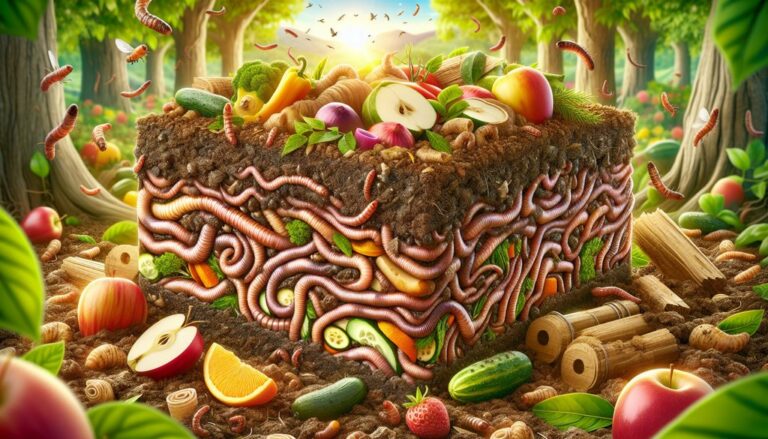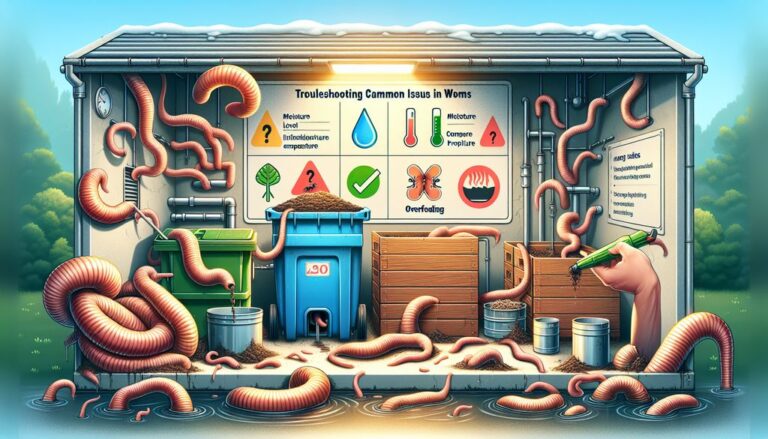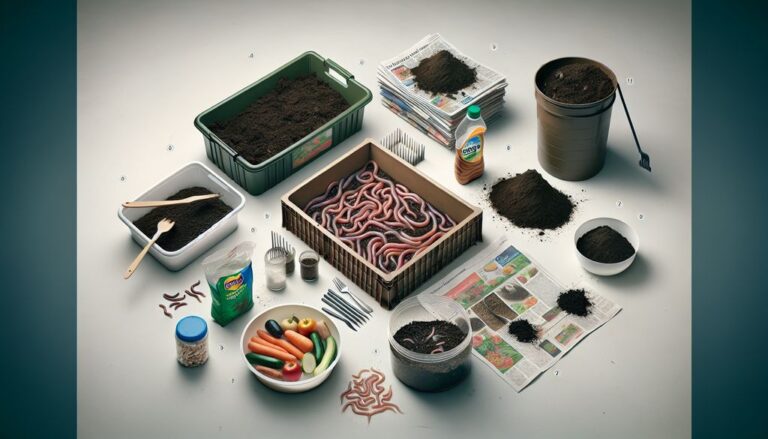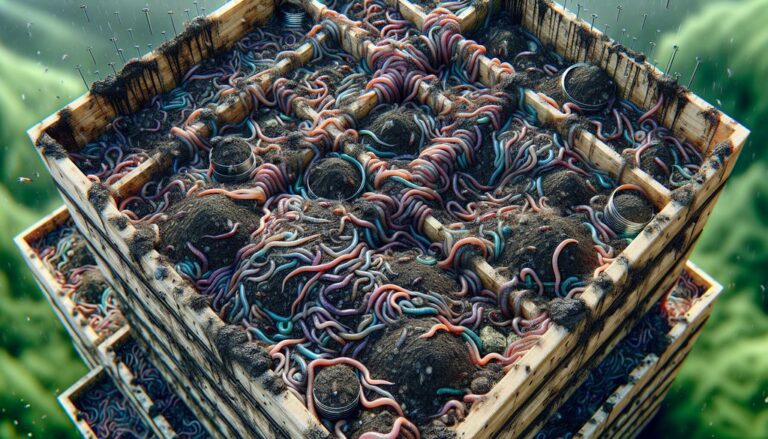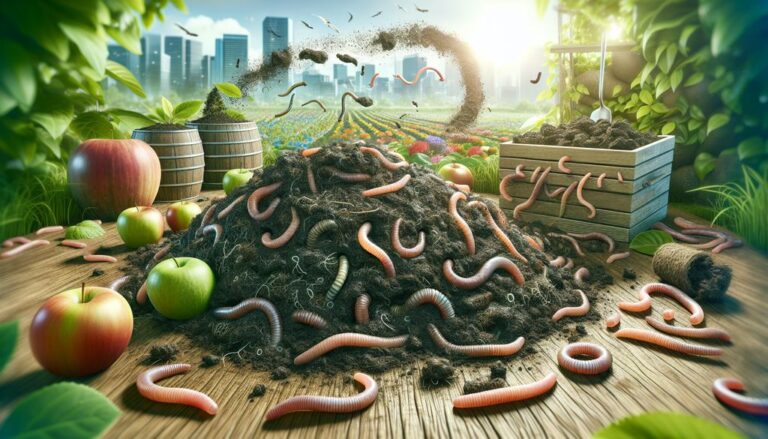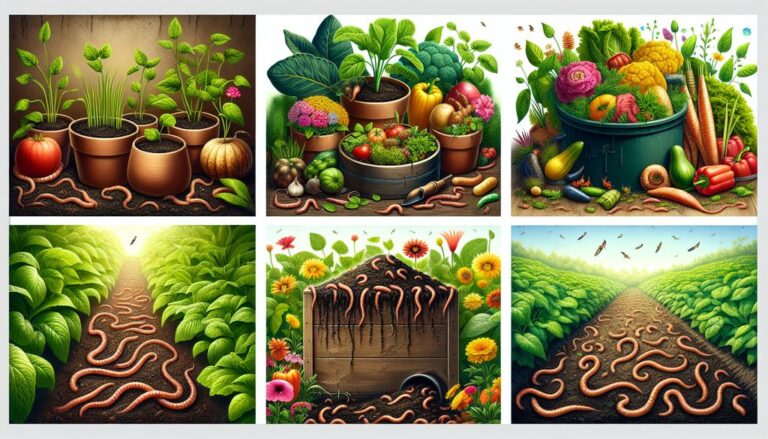Vermiculture, the process of using worms to decompose organic waste, has gained popularity in sustainable gardening practices. In this article, we will explore the role of vermiculture in community gardening, techniques for implementing vermiculture, and strategies for educating and promoting vermiculture within communities.
Key Takeaways
- Vermiculture is a sustainable method for producing nutrient-rich compost.
- Community gardens can benefit from vermiculture through improved soil health and reduced waste.
- Vermicomposting and vermi juice production are effective techniques for implementing vermiculture in community gardens.
- Educating and spreading awareness about vermiculture can lead to greater adoption and participation within communities.
- Vermiculture provides a low-tech, sustainable, and circular alternative to synthetic fertilizers.
The Role of Vermiculture in Sustainable Gardening
Benefits of Vermiculture
Vermiculture, or worm farming, is a cornerstone of sustainable gardening that offers a multitude of benefits. It transforms organic waste into nutrient-rich compost, known as worm castings or ‘Black Gold,’ which can significantly enhance soil health and plant growth. This process not only reduces landfill waste but also provides a natural alternative to chemical fertilizers.
- Soil Enhancement: Worm castings improve soil structure, aeration, and water retention.
- Nutrient-Rich: Castings are high in essential plant nutrients like nitrogen, phosphorus, and potassium.
- Eco-Friendly: Vermiculture reduces the need for synthetic fertilizers, lowering the garden’s carbon footprint.
- Waste Reduction: Organic waste is repurposed, minimizing the amount of waste sent to landfills.
Vermiculture is an accessible and low-tech solution that can be easily integrated into community gardens, offering a sustainable loop from waste to food production.
Moreover, the production of vermi juice, a byproduct of vermiculture, provides a cost-effective and environmentally friendly foliar fertilizer. Diluting vermi juice with water creates a potent feed for plants, further enhancing the sustainability of community gardens.
Implementing Vermiculture in Community Gardens
Integrating vermiculture into community gardens can be a straightforward process that yields significant benefits for soil health and plant growth. Community gardens can become more sustainable by adopting vermiculture practices, which involve the cultivation of worms to break down organic waste into nutrient-rich compost.
To start, community gardeners should identify a suitable space for a vermiculture system, which can be as simple as a worm bin. Here are the basic steps to get started:
- Select an appropriate container or bin for housing the worms.
- Add a mixture of ‘browns’ (carbon-rich materials like dried leaves) and ‘greens’ (nitrogen-rich materials like food scraps).
- Introduce composting worms, such as red wigglers, to the bin.
- Maintain the bin by keeping it moist and aerated, and by regularly adding new organic material.
Vermiculture not only recycles organic waste but also produces ‘black gold’—a term used for the high-quality compost that results from the process.
It’s important to monitor the health of the worms and the compost’s progress. Over time, the community garden will benefit from the continuous supply of natural fertilizer, which can be used to enrich the soil and support the growth of vegetables, fruits, and flowers.
Vermiculture Techniques for Community Gardens
Vermicomposting
Vermicomposting is a method that transforms organic waste into nutrient-rich compost with the help of special composting worms, such as red wigglers. This process is ideal for community gardens, especially in urban areas with limited space, as it can be done indoors or in small outdoor spaces.
To start vermicomposting in a community garden, follow these simple steps:
- Select an appropriate bin: Choose a container that is shallow and wide, with a lid to control moisture and prevent pests.
- Prepare bedding: Shred newspaper or cardboard as a base for your worms to live in.
- Add worms: Red wigglers are the most common and efficient for vermicomposting.
- Feed your worms: Add organic waste such as fruit and vegetable scraps, avoiding meat, dairy, and citrus.
- Maintain the bin: Keep it in a cool, dark place and manage the moisture level.
Vermicomposting not only reduces waste but also produces ‘black gold’ for the garden, enriching the soil with essential nutrients.
Remember to balance the ‘greens’ (nitrogen-rich materials) and ‘browns’ (carbon-rich materials) in your bin. A ratio of roughly 2 parts browns to 1 part greens by volume is recommended to create the ideal conditions for your worms to thrive and efficiently break down the waste.
Vermi Juice Production
Vermi juice, also known as worm juice, is a byproduct of vermiculture that offers a sustainable alternative to synthetic fertilizers. This nutrient-rich liquid is derived from the breakdown of organic waste by red worms, such as the Italian variety used by smallholder farmers like Atieno. Vermi juice is not only cost-effective but also environmentally friendly, as it recycles waste into a valuable resource for plants.
To produce vermi juice, a simple setup is required. Red worms are housed in a container where they consume and break down kitchen and garden waste. The resulting liquid can be collected and diluted with water before being applied to crops. A common dilution ratio is one liter of vermi juice to 10-20 liters of water, which underscores its potency and efficiency.
The application of vermi juice provides numerous benefits to plants, including improved growth and increased resistance to pests and diseases. Here’s a basic guide to using vermi juice in your community garden:
- Collect kitchen and garden waste for the worm bin.
- Maintain the worm bin, ensuring a moist and aerated environment for the worms.
- Harvest the vermi juice from the bottom of the bin.
- Dilute the vermi juice according to the recommended ratio.
- Apply the diluted vermi juice to your plants as a foliar spray or soil drench.
By integrating vermi juice production into community gardening, we can foster a cycle of sustainability that benefits both the environment and our food systems.
Educating and Promoting Vermiculture
Community Workshops
Community workshops are a cornerstone of introducing and integrating vermiculture into community gardening efforts. Hands-on workshops provide practical experience, ensuring participants not only understand the theory behind vermiculture but also how to implement it effectively. These workshops are typically free, but registration is required to manage participation limits and ensure a quality learning environment.
Workshops cover a range of topics from the basics of setting up a worm bin to the nuances of maintaining a healthy vermiculture system. They are designed to be accessible to gardeners of all skill levels.
To facilitate a smooth workshop experience, here are some key points to remember:
- Registration is on a first-come, first-served basis.
- Outdoor workshops are subject to weather conditions and may be rescheduled in case of heavy rain.
- Participants will receive the workshop location via email after registration.
- For any questions or cancellations, it’s important to contact the organizers in advance.
These workshops not only educate but also build a sense of community among gardeners, fostering a shared commitment to sustainable practices.
Spreading Awareness
Spreading awareness is a critical step in integrating vermiculture into community gardening. Educating the public about the environmental and agricultural benefits of vermiculture can lead to increased participation and support. Here are some effective ways to raise awareness:
- Hosting informational booths at local farmers’ markets or community events.
- Creating informative brochures or flyers to distribute in public spaces.
- Utilizing social media platforms to share success stories and educational content.
- Partnering with local schools to introduce vermiculture in educational programs.
By making information accessible and engaging, community gardens can foster a culture of sustainability and encourage more individuals to get involved in vermiculture.
It’s also important to measure the impact of awareness campaigns. Tracking metrics such as workshop attendance, social media engagement, and the number of new participants in community gardening projects can help in understanding the effectiveness of the strategies employed.
Conclusion
In conclusion, integrating vermiculture into community gardening offers a sustainable and circular alternative to synthetic fertilizers. By utilizing organic waste to generate nutrient-rich vermi juice, vermiculture contributes to healthier soils, increased food security, and reduced waste. The process of vermiculture is not only environmentally friendly but also provides an opportunity for community members to engage in sustainable farming practices. With its low-tech approach and minimal maintenance, vermiculture is a practical and effective method for enhancing community gardening initiatives.
Frequently Asked Questions
What is vermiculture and how does it benefit community gardening?
Vermiculture is the process of using worms to decompose organic waste and create nutrient-rich compost, known as worm castings. This compost enriches the soil, promotes plant growth, and reduces the need for synthetic fertilizers in community gardens.
How can vermiculture be implemented in community gardens?
Vermiculture can be implemented in community gardens by setting up worm bins to compost organic waste, educating community members about the process, and integrating vermiculture workshops into gardening activities.
What is vermi juice and how is it produced?
Vermi juice is a nutrient-rich liquid produced by worms as they decompose organic matter. It serves as an effective foliar fertilizer and can be cultivated by utilizing locally available farm waste to cultivate red Italian worms.
What are the benefits of vermiculture over synthetic fertilizers?
Vermiculture provides a sustainable and circular alternative to synthetic fertilizers by utilizing organic waste to generate nutrient-rich compost and liquid fertilizer. It promotes soil health, reduces waste, and enhances plant nutrition in community gardens.
What are the best vermiculture techniques for urban and limited space gardening?
For urban and limited space gardening, vermicomposting with special composting worms is an ideal technique. Worm bins can be kept indoors or in small outdoor spaces, making them suitable for urban dwellers.
How can vermiculture be used to educate children about sustainable gardening practices?
Vermiculture can be used to educate children about worm biology, decomposition, waste reduction, and the creation of nutrient-rich compost. It provides a hands-on learning experience and promotes sustainable gardening practices.

